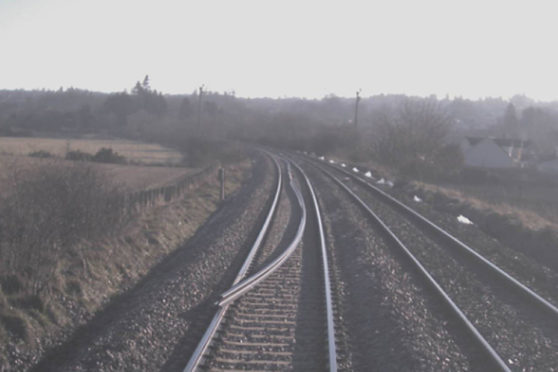A passenger train travelling at 53mph crashed into the end of a piece of rail left on a track during maintenance work on the outskirts of Inverness, a probe by a Government watchdog has found.
Investigators said the speed of impact of the collision last month near Cradlehall had pushed the 425ft rail – the length of a football field – off the track and prevented derailment of the Inverness to London Virgin East Coast train, which was not damaged.
However, the Rail Accident Investigation Branch (RAIB) has issued urgent safety advice to Network Rail following the “serious” incident on February 25 involving a busy morning train to London.
Workers involved in the engineering works have been suspended from front-line operations while an investigation by Network Rail continues.
A spokesman for RAIB said: “Over the last four years there have been a number of incidents in which railway lines have been returned to service in an unsafe condition following engineering work.
“In all such cases there is a real potential for serious harm to people on subsequent train services.
“In light of these incidents -and given the serious nature of the most recent incident – the RAIB advises Network Rail to take urgent steps to review the effectiveness of the steps it has already taken to address this risk and to implement any additional measures that are required.”
The piece of rail about had been left on the up line at Cradlehall, a short distance south of Inverness.
The RAIB spokesman said: “This was the first train to pass over the route that day.
“The train pushed the whole length of rail aside into the cess and so did not derail.
“The rail had been moved from the cess on the opposite side of the line during engineering work which took place the previous night.”
Alex Hynes, managing director of ScotRail Alliance – which Network Rail in Scotland is part of – said: “We launched a full investigation after this incident and have taken immediate steps to highlight the seriousness to all our employees.
“Those staff involved directly in the incident are currently not working in front line roles, while they assist with the investigation.
“We have emphasised to our track maintenance teams the importance of thoroughly inspecting all completed work before any trains are allowed to run and are reviewing how we manage this type of maintenance work.
“The safety of our customers should never be put at risk. We are learning from this incident and putting additional measures in place to prevent a similar incident occurring in Scotland in the future.”
